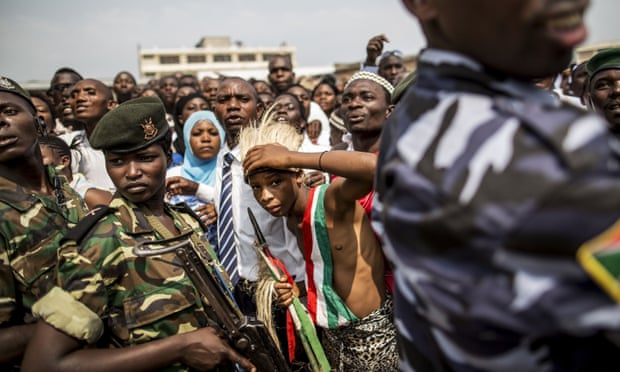
The UN security council must intervene in Burundi to prevent mass atrocities and the risk of a regional conflict, seven independent UN human rights investigatorssaid just days ahead of a controversial presidential election that has alreadytriggered a failed coup and caused dozens of deaths.
The investigators warned that the 21 July poll, at the heart of a political crisis in the east African country, was likely to trigger major instability and clashes that could spread across its borders.
The experts warned that the situation was accumulating “the well-known and visible marks of a society which previously suffered divisions leading to grave violence”.“The international community must not simply stand by and wait for mass atrocities to unfold, thereby risking a major conflict of regional proportions before it finally decides to act,” the human rights experts said in a statement issued by the office of the UN high commissioner for human rights.
Opposition politicians have accused President Pierre Nkurunziza of violating the constitution by running for a third term and are boycotting the vote. Nkurunziza and his ruling party cite a constitutional court ruling allowing him to stay.
Dozens of people have already died in protests in the world’s third poorest country, which emerged from civil war in 2005. Hundreds of thousands have fled to other states with a history of ethnic conflict, including neighbouring Rwanda.
Gunfire and grenade explosions have hit the capital Bujumbura in recent nights, as has been common in the past weeks. Burundian military sources also reported fresh clashes with rebels in a forested area in the north of the country and near the border with Rwanda.
The experts said the security council must “take immediate action to preventBurundi from sliding back into conflict”. They did not specify what action they felt was necessary.
The government did not immediately respond to the experts’ statement but has said the vote will be fair, and dismissed rights groups’ accusations that it is arming the Imbonerakure youth militia to crack down on dissent.
Nkurunziza has resisted calls from Washington and other major donors not to stand, and regional powers have asked Uganda’s President Yoweri Museveni to mediate.
The Ugandan defence minister Crispus Kiyonga arrived in Bujumbura on Thursday, a day after Museveni left saying that he had secured a commitment from the government, opposition and civil society to negotiate “without interruption”.
Several rounds of prior talks, mediated by the UN, have failed to resolve the political crisis, however. The government has so far rejected opposition demands for a further delay of the presidential vote.
Nkurunziza’s ruling party scored a widely expected landslide win in parliamentary polls held on 29 June, but these were boycotted by the opposition and condemned internationally as not free and fair.
The human rights experts said there had been efforts to coerce the judiciary, some of whom had fled Burundi saying their lives were at risk, while armed militias were using violence against civilians.
“This is a crisis that is eminently preventable – everyone can see the risks,” said the investigators, each of whom holds a mandate from the UN human rights council to investigate different areas of human rights.
“This can escalate into major conflict through the use of outright repression against, and intimidation of, the population at large, the instrumentalisation of the police, the closure of independent media, as well as the detention of the opposition and other civic leaders,” they added.

No comments:
Post a Comment